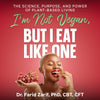Dr. Farid Zarif
ADA (Anti-Depression & Anxiety
Couldn't load pickup availability
Valerian Root: Supporting Nervous System Balance
-
Historical Use:
Valerian root (Valeriana officinalis) has been used for centuries in traditional herbal practices, with references dating back to Greek physicians like Dioscorides and Galen. It has a long-standing reputation for supporting a healthy nervous system and promoting emotional balance. -
Mood and Nervous System Support:
Valerian is often associated with maintaining a calm and balanced mood. Its bioactive components, such as valerenic acid and iridoids (including valepotriates), are thought to interact with the body’s natural processes to support the nervous system. -
Mechanism of Action:
Research suggests that valerian may influence gamma-aminobutyric acid (GABA) activity, a neurotransmitter involved in regulating mood and nervous system responses. By supporting GABA availability in the central nervous system, valerian root is thought to help maintain a healthy equilibrium during times of restlessness. Additional studies are ongoing to further explore these mechanisms and their potential benefits.
St. John’s Wort: Supporting a Healthy Nervous System
-
Historical Significance:
St. John’s Wort (Hypericum perforatum) is a flowering plant with a long history of use in traditional herbal practices. Widely utilized in Europe, it is often included in formulations aimed at promoting nervous system balance and maintaining a healthy mood. -
Key Active Compounds:
The primary active compounds in St. John’s Wort, hypericin and pseudohypericin, are thought to support the nervous system by influencing the body's natural processes related to neurotransmitter levels. These compounds may play a role in the regulation of serotonin, dopamine, and norepinephrine, which are associated with mood and emotional balance. -
Additional Bioactive Components:
Recent studies suggest that hyperforin and adhyperforin, additional compounds found in St. John’s Wort, may also contribute to its effects. These components are believed to interact with chemical messengers in the nervous system, supporting mood stability and maintaining a sense of balance during periods of emotional fluctuation. Further research is ongoing to better understand the mechanisms of these compounds.
Passionflower: Supporting Mood and Nervous System Balance
-
Traditional Use and Origin:
Passionflower (Passiflora incarnata), a climbing vine native to the southeastern United States and parts of Central and South America, has been traditionally used as both a food source and an herb for wellness. Its association with promoting calm and balance dates back to its discovery by Spanish explorers in 1569, who named it for its symbolic resemblance to Christ’s passion. -
Nervine Properties:
Passionflower is classified as a nervine herb, traditionally used to support mood and maintain nervous system balance during periods of stress. It has been included in herbal practices to promote relaxation and emotional stability, particularly for those experiencing occasional restlessness or difficulty unwinding. -
Active Compounds and Mechanism:
Passionflower contains Gamma-Aminobutyric Acid (GABA), a neurotransmitter that plays a role in regulating mood and promoting balance within the nervous system. By increasing the availability of GABA in the brain, passionflower is thought to help counter excitatory signals, contributing to a sense of calm. Ongoing research continues to explore its potential role in supporting mood and relaxation.
The information provided above is for educational purposes only and does not pertain to the performance or intended use of any specific products featured on this website.
*These statements have not been evaluated by the Food and Drug Administration. This product is not intended to diagnose, treat, cure, or prevent any disease.
